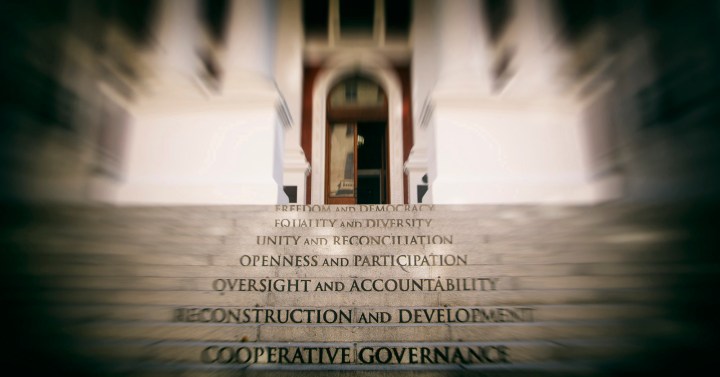GENERAL LAWS AMENDMENT BILL
Period for public comments on greylisting bill extended after NPO sector raises red flags

The NPO sector has sounded the alarm over the General Laws Amendment Bill — including that the public consultation process was rushed and inadequate. The period for public submissions on the bill has now been extended.
The period for public comments on the General Laws Amendment Bill has been extended to Tuesday, 25 October. This decision comes after civil society raised serious concerns about a rushed public participation process for the bill, as well as the impact its requirements would have on South Africa’s nonprofit sector.
The bill was originally open for public comments between 27 September and 10 October — a period that left many stakeholders scrambling to make submissions and raise awareness of the document’s shortcomings.
“You had nine-and-a-half working days, effectively, of public consultation on something which most civil society organisations had no idea was coming. It wasn’t like it was widely publicised,” said William Bird, member of the NPO Working Group and director of Media Monitoring Africa.
Read more in Daily Maverick: “After a massive outcry from civil society, Finance committee refuses to rubber-stamp greylisting bill”
The General Laws Amendment Bill, tabled in Parliament on 29 August, has as its full title the “General Laws (Anti-Money Laundering and Combating Terrorism Financing) Amendment Bill” and is an omnibus bill that will enact amendments across several acts, including the Nonprofit Organisations Act.
The bill is intended to address deficiencies identified in the Financial Action Task Force’s (FATF) Mutual Evaluation Report of South Africa from October 2021. Failure to do so ahead of the FATF’s looming February 2023 deadline for implementing improvements could result in the country being greylisted.
Bird pointed out that while there has been awareness of the FATF’s Mutual Evaluation Report for over a year, there was no consultation with the NPO sector about the changes in the General Laws Amendment Bill before its public release on 27 September 2022.
Read more in Daily Maverick: “SA’s harebrained scheme to register NPOs will not solve terrorist financing concerns”
The extension of the deadline for public submissions shows that the voice of civil society can make a difference, says Dale McKinley, a spokesperson for Kopanang Africa Against Xenophobia.
“It is a small victory, but it’s a positive one… it gives us space and a window for more submissions,” he said. “Many people only found out about [the bill] within the last week, and now… I think organisations are getting on top of this.”
Capacity of the NPO Directorate
A key concern for civil society is that the General Laws Amendment Bill in its current form will make registration compulsory for every nonprofit — from church groups to sports clubs to advocacy organisations — with the aim of identifying money laundering and terrorist financing within the sector.
The requirement is at odds with the capacity of the NPO Directorate, the public office under the Department of Social Development that holds information about registered NPOs for the public to access. Registration with the directorate is voluntary.
“One of the important points to be made is that the NPO Directorate was not set up or structured to play a mandatory regulatory and overview role. It was set up to enable and to uplift. So, it doesn’t have any of the systems or the abilities to do the audit [and] the watchdog work,” explained Nicole Copley, founder of ngoLAW, which provides legal advice and assistance to nonprofits.
Read more in Daily Maverick: “Mandatory registration requirement in money-laundering and terrorist financing bill will badly hurt SA nonprofits”
Human capacity and budget constraints at the directorate mean that it is not always able to fulfil its current mandate. This includes keeping the NPO registry up to date and processing the annual reports submitted by registered civil society organisations.
“More than half of the applications [to register] we lodge for clients bounce for no good reason because people at the directorate are not reading… the documents we lodge. And the same with the annual reports — we lodge everything, they are exactly as they should be, and they are rejected,” said Copley.
The NPO registry is currently about 10 years out of date, as organisations that have failed to submit reports annually have not been struck from the register.
“NPO registration itself has lost credibility over the past decade,” said Copley. “Just catching that up is going to be such a mammoth task, and they won’t have time to do anything else.”
Maverick Citizen sent the Department of Social Development a list of questions about the capacity of the NPO Directorate, the concerns of civil society members and the implications of the General Laws Amendment Bill for ongoing processes around the NPO Amendment Bill.
Read more in Daily Maverick: “Petition calls for total recall of NPO Amendment Bill amid fears for sector”
Responding, department spokesperson Lumka Oliphant said: “The NPO Amendment Bill is separate from the General Amendment Laws. The NPO Directorate within the Department of Social Development is working with other relevant stakeholders within government in ensuring the amendments achieve the objective.
“In due course the public will be appraised on the process and will be informed of all other relevant information.”
The General Laws Amendment Bill’s compulsory registration requirement could see the shutting down or criminalisation of NPOs that are unable to register due to issues of capacity or access, according to McKinley.
“The other thing, of course, is that [the bill] opens a space for those in the state who want to really go after… certain civil society organisations that have been very critical of them, [to do so] by using this bill,” he said. “So… using the legislation to politically target and make it very difficult for NPOs to operate.”
Targeted approach
In the FATF’s Recommendation 8 — focused on the NPO sector and the potential use of the NPOs as vehicles for money laundering and terrorism financing — it is stated that countries should apply “focused and proportionate measures” aligned with a “risk-based approach” when protecting civil society from financial abuse.
“Countries should take a targeted approach to implementing the measures called for in Recommendation 8, including oversight and regulatory mechanisms, based on an understanding of the diversity of the NPO sector and the terrorism risks faced by the domestic NPO sector,” according to the recommendation.
Copley’s recommendation is that registration efforts focus on voluntary associations that are conduit funders — meaning they receive and disburse funds — of more than R1-million per year. These organisations should be registered with the Companies and Intellectual Property Commission (CIPC) as nonprofit companies, she said, as the CIPC’s systems are better capacitated for collecting and finding data than those at the NPO Directorate.
Copley argued that if the bill goes through in its current form, “public outrage” in the NPO sector would undermine its objectives in terms of anti-greylisting.
“Compulsory universal NPO registration would create a major rift with the NPO sector, and it’s going to break the institutions that are meant to be keeping it together,” she said.
“If it were evident that there was a major rift, and that the NGO sector wasn’t on board and… agreeing, I think that [in] itself would be damaging to what this bill is trying to accomplish.”
Maverick Citizen asked the National Treasury for comment on the concerns of civil society and the nature of the consultation process for the bill, but had not received a response at the time of publishing. DM/MC

















 Become an Insider
Become an Insider
Comments - Please login in order to comment.